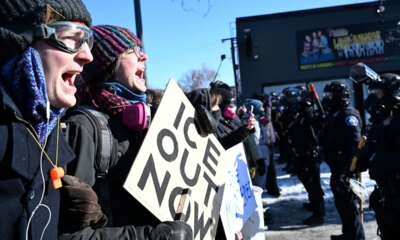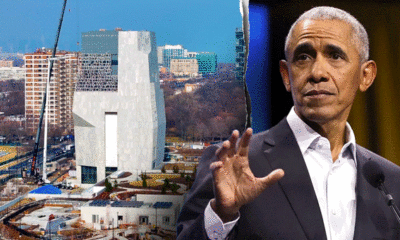Illinois
Coalition of business, labor and agriculture groups support Illinois lawmakers’ carbon capture and storage plan

SPRINGFIELD (WGEM) – A bill in the Illinois legislature would create a regulatory framework to streamline carbon capture and storage projects in the state.
Sponsored by state Rep. Jay Hoffman, D-Swansea, the plan is backed by the Illinois Manufacturers’ Association, Climate Jobs Illinois and Matt Rush, the former president of the Illinois Corn Growers Association.
“We’re falling short in our decarbonization goals,” said state Sen. Bill Cunningham, D-Chicago.
Cunningham is sponsoring the senate version of the bill. He said Illinois is not going to meet its goal of having at least 25% of its energy come from renewable sources by 2025.
“We have to look for new ways to stop damaging carbon from going into our environment and warming the planet, and carbon capture technology can do that,” Cunningham said.
Carbon capture and storage has three main components according to the Clean Air Task Force:
- Carbon dioxide is captured from the exhaust facility and separated from other gasses that go into the atmosphere.
- The carbon dioxide is then taken to a geological storage site, typically by pipeline, rail truck or ship.
- The carbon dioxide is then stored underground usually at least a mile below the ground.
“Carbon capture and storage is a proven technology. It is safe and viable, and Illinois is poised to be a global leader in climate management due to our exceptional geology, natural resources and a robust regulatory framework, all of which have been demonstrated in our state,” said carbon capture and storage scientist Sallie Greenberg.
She led a 2022 study on the technology that estimated carbon capture and storage could create more than 14,000 jobs in Illinois. It also precited carbon capture and storage could pump more $3 billion into the state’s economy over a decade.
“With this legislation, we can decarbonize without deindustrializing our state. Illinois can lead the way sustainably and economically, ensuring that businesses will be able to innovate and grow for decades to come,” said Illinois Manufacturers’ Association President and CEO Mark Denzler.
Not everyone’s on board with the proposal.
The Sierra Club Illinois Chapter released a statement opposing the legislation:
“Illinois is woefully unprotected and unprepared for the threat from the fossil fuel industry to make Illinois a ground-zero state for carbon capture. The legislation introduced last week does not adequately protect Illinois communities, our water, and our climate from the dangers of carbon capture and sequestration (CCS) because it focuses solely on sequestration. We need legislation that regulates CO2 pipelines at every point of the CCS industrial cycle, including at the point of capture and when transported through pipelines. We’re working with landowners, farmers, and advocates across the state to instead advance common-sense legislation that puts a moratorium on CO2 pipelines to ensure our water resources are protected and that all liability rests with private developers, not Illinois taxpayers.”
Copyright 2024 WGEM. All rights reserved.

Illinois
Illinois lawmakers consider tightening DUI law to 0.05 BAC

COLLINSVILLE, Ill. (First Alert 4) – Right now, in Illinois, Missouri and most of the country, drivers must be at or over 0.08 to get a DUI. A proposal in the Illinois Statehouse would lower that threshold.
“Make it as safe as you possibly can out there,” said John Sapolis.
Collinsville resident John Sapolis said while lowering Illinois’ DUI threshold would not affect him, as he rarely drinks, he likes the idea of getting drinkers off the road.
“It’s bad enough out there driving around with people who are not drinking,” said Sapolis.
If a bill passes in the Illinois House of Representatives, the blood alcohol limit would be lowered, meaning fewer drinks could put somebody over the line for a DUI.
Two Chicago-area lawmakers propose lowering the threshold from 0.08 to 0.05.
“Your body still is not in a proper state to really be behind the wheel,” said Erin Doherty, Regional Executive Director for Mothers Against Drunk Driving.
Doherty said even at 0.05, drivers are less coordinated and cannot track moving objects as well as when they are sober.
Utah is the only state in the country to have the 0.05 limit, and Doherty said one in five drivers there changed their behavior.
“There are so many other options before getting behind the wheel,” said Doherty.
Sara Floyd used to live in Utah and now calls Collinsville home.
“The Midwest people like to have a few beers while they watch their Little League games
“In Utah, you can barely get alcohol at a gas station,” said Floyd.
She said the culture in Utah is very different and thinks there should be some wiggle room for drivers.
“If one person had a beer within an hour period and then drove, they shouldn’t get a DUI for one drink,” said Floyd.
Doherty said they do not recommend driving even after a single drink.
“You really should not get behind the wheel when you’re any kind of impaired, one drink, five drinks, whatever that looks like, just don’t drive,” said Doherty.
While each body processes alcohol differently, according to the National Library of Medicine, in a two-hour period it takes a 170-pound man three to four drinks to reach 0.05, and it takes a 137-pound woman two to three drinks to reach the same state.
April Sage said she does not think this law would work, saying instead it would help more if the state added more public transit.
“I could have three beers and get a ride home safely,” said Sage.
First Alert 4 reached out to a spokesman for the Illinois Department of Transportation to see if they had any comments on this bill. The spokesperson said they are not going to comment because it is pending legislation.
According to the Illinois Department of Public Health, fatal crashes involving one driver who had been drinking increased 4% from 2019 to 2022, despite multiple studies showing fewer Americans are drinking.
Copyright 2026 KMOV. All rights reserved.
Illinois
Voters had no choice in nearly 9-in-10 primary elections

Illinois voting data shows voters had no choice of candidate in nearly 9-in-10 Democratic and Republican primaries for state and federal office in 2024.
Voters had no choice of candidate in nearly nine out of every 10 Republican and Democratic primary elections for state and federal office in 2024.
Analysis of Illinois voting data shows Democrats ran one or no candidate in 135 of the 155 primary elections for the U.S. House, Illinois Senate and Illinois House. That left voters with a choice between candidates in just 20 races.
Meanwhile, Republicans only ran one or no candidate in 137 of the 155 primary elections last year for non-judicial state and federal positions, giving voters of a choice in just 18 races.
In total, there were 155 primaries for the U.S. House of Representatives, Illinois Senate and Illinois House in 2024. Democrats did not run a candidate in 28 of these races while Republicans failed to run a candidate in 50.
And in the 107 Democratic primaries and 87 Republican primaries were only one candidate ran for the position, those candidates secured their spot on the general election ballot with a single primary vote.
To get on the primary ballot for Illinois Senate, the Illinois General Assembly mandates established party candidates to get 1,000 petition signatures from district party members. Illinois House candidates need 500 signatures. For U.S. House, either party’s candidates need signatures from 0.5% of all primary voters from their party in the district.
This lack of choice between candidates for Democratic and Republican party primaries also left general election voters with fewer choices on the ballot.
In the 2024 election cycle, 65 of the 155 non-judicial state and federal general elections had only one candidate on the ballot. That means in 65 districts, it only took one vote for a candidate to win a seat representing the entire district.
Illinoisans already suffer from a lack of choice in candidates. Research shows an average of 4.7 million Illinois voters had no choice in their state representative between the 2012 and 2020 election cycles.
Research shows more choice drives voter participation and makes legislators less susceptible to the influence of lobbyists and special interests. Lightly contested elections also tend to skew policies in favor of powerful special interests.
Illinois should consider reforms that will give voters more choices at the ballot box, such as making it easier for independents to enter the general election like they do in Iowa, Wisconsin and Tennessee.
Until that happens, Illinoisans will continue to see elections with too few choices and too much influence handed to those already in power.
Illinois
2 men shot, 1 fatally, outside bar in Morris, police say

MORRIS, Ill. (WLS) — A man was killed and another was injured in a shooting outside of a bar in Grundy County.
The shooting happened early Saturday outside of Clayton’s Tap in the 100 block of West Washington Street in Morris, Illinois, officials said.
ABC7 Chicago is now streaming 24/7. Click here to watch
The Grundy County Sheriff’s Office responded to the scene, where they found two men with gunshot wounds. One was pronounced dead at the scene and the other was taken to a hospital in critical condition.
The victim who died was identified by the Grundy County Coroner’s Office as 35-year-old Julian Rosario of Channahon.
A suspect in the shooting, 22-year-old Marshall Szpara of Seneca, was arrested and “initially charged with two counts of aggravated battery with a firearm, pending further review from the Grundy County States Attorney’s office,” Morris police said.
No further information was available.
Copyright © 2026 WLS-TV. All Rights Reserved.
-

 World6 days ago
World6 days agoExclusive: DeepSeek withholds latest AI model from US chipmakers including Nvidia, sources say
-

 Massachusetts6 days ago
Massachusetts6 days agoMother and daughter injured in Taunton house explosion
-

 Denver, CO6 days ago
Denver, CO6 days ago10 acres charred, 5 injured in Thornton grass fire, evacuation orders lifted
-

 Louisiana1 week ago
Louisiana1 week agoWildfire near Gum Swamp Road in Livingston Parish now under control; more than 200 acres burned
-

 Oregon4 days ago
Oregon4 days ago2026 OSAA Oregon Wrestling State Championship Results And Brackets – FloWrestling
-

 Florida2 days ago
Florida2 days agoFlorida man rescued after being stuck in shoulder-deep mud for days
-

 Technology1 week ago
Technology1 week agoArturia’s FX Collection 6 adds two new effects and a $99 intro version
-

 News1 week ago
News1 week agoVideo: How Lunar New Year Traditions Take Root Across America






















